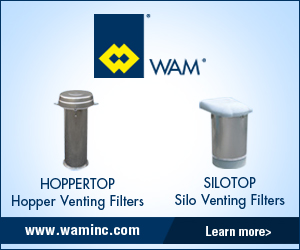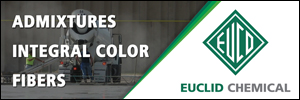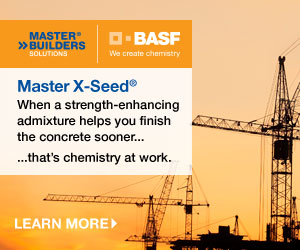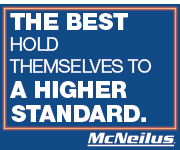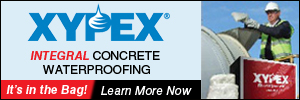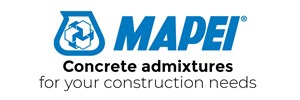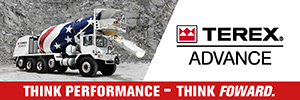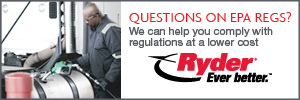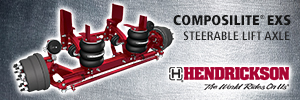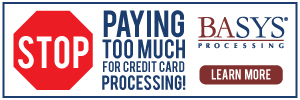 |
||||||||||||
|
||||||||||||
|
Association & Industry News
Save $100 by registering for NRMCA’s 2020 Annual Convention by Friday, January 17. It is scheduled for March 7-9 at the Encore at Wynn Las Vegas Hotel in Las Vegas, NV. You can access event registration by clicking here. NRMCA’s 2020 Convention is co-located with the Portland Cement Association and the National Stone, Sand & Gravel Association’s annual conventions and special discount pricing is available to those that are members of all three associations. In addition, these events immediately precede the CONEXPO-CON/AGG Show, and convention attendees receive significant discounts on show registration and seminar tickets when you register for the show at the same time through the link listed above. NRMCA has contracted a block of rooms at the Encore at a discounted rate of $319/night plus applicable taxes with a daily resort fee of $25/night plus applicable taxes. We encourage you to register for the convention and, once registered, you will be directed to make your hotel reservations. The reservations cut-off date is Tuesday, February 11 or whenever the room block sells out, whichever occurs first. The room block is reserved for attendees of the NRMCA 2020 Annual Convention. Event information is accessible by clicking here. For more information, please contact Senior Director of Meetings Jessica Walgenbach at 703-706-4852. The deadline for submissions for the annual Concrete Cares Award has been extended to Friday, January 24. The Concrete Cares Award was established by the Manufacturers, Products & Services (MPS) Division to recognize outstanding contributions in community service by an NRMCA Producer member company. With ready mixed concrete plants in almost every community in America, NRMCA member companies are making a real difference. From Earth Day celebrations to organized volunteering for Boys & Girls Clubs, local schools and recreation departments, to raising awareness for breast cancer screenings, ready mixed concrete producers are at work every day in their communities. The Concrete Cares Award aims to recognize these efforts and shine a national spotlight on the positive impact ready mixed concrete companies have in hometowns across the nation. A donation in the name of the selected honoree will be made to the charity of its choice. The award will be presented at the upcoming NRMCA Annual Convention in March during the Association’s annual awards breakfast. Ready mixed concrete producers that are members of NRMCA are eligible for nomination. Click here for submission guidelines. Completed applications should be forwarded to Brett Ruffing, senior vice president, membership, by e-mail at bruffing@nrmca.org or mail to 66 Canal Center Plaza, Suite 250, Alexandria, VA 22314.
Engineering
The NRMCA Regional Concrete Technologist Training and Certification program (Short Course) is scheduled for January 27-31 at the Hilton Garden Inn in Ontario, CA. Interested persons are encouraged to register now! The Technical Short Course provides a fundamental understanding of concrete, aggregates and concrete making materials; requirements in industry codes and standards and proportioning concrete mixtures. Attendees have the opportunity to obtain industry-recognized NRMCA certifications, including NRMCA Level 2 and 3 Concrete Technologist certification and an optional NRMCA Grade II Field Testing Technician certification. The NRMCA Short Course is intended for quality, sales and other personnel with a technical role with ready mixed concrete companies and suppliers to the industry. New hires in these roles can also benefit from attending. A significant amount of technical content is covered in four days that requires the attendees to have a basic concrete technology background and at least a high-school level of math. Click here for more information, including registration options. NRMCA, in conjunction with the Carolinas Ready Mixed Concrete Association, is presenting the one-day course, Improving Concrete Quality, intended for concrete producers, ingredient material suppliers, engineers and testing labs on April 29 in Charlotte, NC, Improved concrete quality can benefit all stakeholders in a concrete construction project. This course will address the following questions:
Course instructors are Kevin MacDonald, Ph.D., FACI, Beton Consulting Engineers LLC, and Karthik Obla, Ph.D., P.E. at NRMCA. Producers will learn readily-implementable steps to manage variability and attain a more consistent product; ingredient suppliers will learn how material variation affects concrete variation; engineers will learn the opportunity for improving quality through specifications and testing lab professionals will learn to measure and improve testing quality. Upon successful completion of the course, attendees will earn 8 professional development hours, a certificate of completion and credits toward NRMCA’s STEPS program. Click here for more information, including registration options and staff contact. The NCC E-News is issued by the National Concrete Pavement Technology Center. The following are covered in more detail with links to research and other reports. • The January 2020 MAP Brief, Development and Deployment of the Next Generation Concrete Surface describes the Next Generation Concrete Surface (NGCS) and the latest innovation in concrete texture. • Implementation of a Testing Protocol for Approving Alternative Supplementary Cementitious Materials (SCMs): Natural Minerals and Reclaimed and Remediated Fly Ashes - Supplementary cementitious materials (SCMs) provide many benefits to concrete mixtures in terms of cost, strength and durability. Class F fly ash is the most widely used SCM in Texas, but its availability is dwindling while demand is increasing. Given the importance of Class F fly ash as a means to improve concrete durability, it is important to find alternative materials that can maintain the high quality and durability of concrete required in Texas. • Construction of Crack-Free Bridge Decks (April 2017) - The goal of the study described in this final report “Construction of Crack-Free Bridge Decks” for Transportation Pooled-Fund Program Project No. TPF-5(174) was to implement the most cost-effective techniques for improving bridge deck life through the reduction of cracking. Work was performed both in the laboratory and in the field, resulting in the construction of 17 bridge decks in Kansas that were let under Low-Cracking High-Performance Concrete (LC-HPC) specifications. The report documents the performance of the decks based on crack surveys performed on the LC-HPC decks and matching control bridge decks. • Proposed Enhancements to Pavement ME Design: Improved Consideration of the Influence of Subgrade and Unbound Layers on Pavement Performance (2019) - The American Association of Transportation Officials’ (AASHTO) pavement mechanistic-empirical (ME) design software, AASHTOWare Pavement ME Design, and the AASHTO Mechanistic-Empirical Pavement Design Guide Manual of Practice (MEPDG) provide a methodology for the analysis and performance prediction of pavements and overlays. The performance of flexible and rigid pavements is known to be closely related to properties of the base, subbase and/or subgrade. However, some recent research studies indicated that the performance predicted by this methodology shows a low sensitivity to the properties of underlying layers and does not always reflect the extent of the anticipated effect so the procedures contained in the Pavement ME Design need to be evaluated. • Impact of Joint Spacing on Bonded Concrete Overlay of Existing Asphalt Pavement in the AASHTOWare Pavement ME Design Software - This paper describes the impact of joint spacing or panel size on the performance and relative cost of short jointed bonded concrete overlay of asphalt (SJPCP) pavement using the AASHTO Pavement ME Design procedure. Joint spacing, or panel dimension, is a critical design issue that greatly affects both performance and cost of the SJPCP as well as conventional jointed plain concrete pavement (JPCP) overlays. In fact, pavement performance is more dictated by the panel size than thickness. Three factors that greatly affect the performance of SJPCP include (1) traffic (truck) volume, (2) wheel load placement and panel size, and (3) layer bonding of portland cement concrete (PCC) to asphalt concrete (AC). This paper focuses on the second point, wheel placement or panel size, which defines the location of critical stresses, location of fatigue damage along the transverse joint and initiation of corner, longitudinal and transverse fatigue cracking. • Impact of Water/Cementitious-Based Concrete Mix Design Specification Changes on Concrete Pavement Quality (July 2018) - This research investigated the impact of Minnesota DOT implementing a w/cm-based specification for concrete pavements. Pavement sections constructed before and after the specification implementation were examined to assess permeability, compressive strength and air-void system parameters. Pavement management system data was examined to identify changes in ride quality associated with the specification change. • Relationship Between Erodibility and Properties of Soils (2019) - The goal of this project is to develop reliable and simple equations quantifying the erodibility of soils based on soil properties. The reliability must take into account the accuracy required for erosion-related projects while the simplicity must consider the economic aspects of erosion-related projects. Different soils exhibit different erodibility (sand, clay); therefore, erodibility is tied to soil properties. However, many researchers have attempted to develop such equations without much success. One problem is that erodibility is not a single number but a relationship between the erosion rate and the water velocity or the hydraulic shear stress. This erosion function is a curve and it is difficult to correlate a curve to soil properties. Another problem that needs to be solved is associated with the availability of several erosion testing devices. • Effect of Fiber Characteristics on Fresh Properties of Fiber-Reinforced Concrete with Adapted Rheology - The influence of fiber type and volume on fresh properties of fiber-reinforced self-consolidating concrete (FR-SCC) and fiber-reinforced super-workable concrete (FR-SWC) was investigated. These mixtures were developed for infrastructure construction and repair, respectively, and the fibers were incorporated to reduce cracking and enhance service life of concrete structures. Click here to access the newsletter. SEO
As of January 6, 2020, commercial motor vehicle carriers were required to be registered with the new, secure Federal Motor Carrier Safety Administration (FMCSA) Drug and Alcohol Clearinghouse. However, for the past week or so, due to an influx of companies and drivers registering and query requests, the Clearinghouse website has been crashing. In an effort to not inadvertently put companies out of compliance for not being able to conduct pre-employment queries, FMCSA stated on its website, “If you are an employer currently experiencing technical difficulties accessing the Clearinghouse and are unable to conduct required pre-employment queries, you may hire a driver using solely the procedures set forth in 49 CFR 391.23(e). Once FMCSA has determined and announced that users are able to access the Clearinghouse, pre-employment queries must also be conducted as required by section 382.701(a).” It is important to understand, however, that while this process is temporary, once the Clearinghouse website is back up and running, employers will then need to use the site to conduct the full pre-employment query. Despite the technical difficulties, carriers are now required to input all their CDL-holders’ positive drug and alcohol tests, refused tests and return-to-duty testing elements. Carriers are also required to query the Clearinghouse for prospective drivers that may have drug and alcohol program violations and annually query for all drivers to check for any positive tests before a driver is allowed to operate a commercial motor vehicle (CMV) on public roadways. Furthermore, carriers are required to have consent from their drivers before conducting a driver query of the Clearinghouse. In order to gain consent from drivers, while not required of drivers, those drivers wishing to continue to drive for the carrier will need to register with the Clearinghouse to grant consent and to review their own information. Driver and carrier registration are completed online through FMCSA’s website. Specifically, the elements for the Clearinghouse carriers and drivers need to know are: 1. This is NOT a proposal; this program was finalized in December 2016 and became effective January 6, 2020. 2. Carriers are required to be registered with the Clearinghouse. 3. Drivers must give consent to employers in one of two ways. Written consent is all that is needed if the employer is only conducting a limited query. Drivers must give consent by registering online if employers are conducting a full query (see #6 below). 4. The Clearinghouse will contain only driver positive drug/alcohol tests, refused tests and the steps completed for the return-to-duty process after a positive test. 5. Information gathered in the Clearinghouse will be nationwide, meaning drivers that move jobs frequently will have information in the Clearinghouse accessible to all current and future carriers from January 6, 2020 onward. 6. There are two types of queries that can be performed: full and limited. A full query is required for pre-employment and if a positive test is shown in the Clearinghouse. A limited query is a query by carriers of all their CDL-holders annually to determine if a positive test is shown in the Clearinghouse. 7. Carriers can use third-party services to both report violations and query their drivers. However, third-party services must be made as the carrier’s designated service agent when the carrier registers and the third-party must be an authorized service registered through FMCSA. 8. Querying the Clearinghouse does have a cost. While single queries cost $1.25 for limited and full queries, carriers can purchase “bundles” of queries based on the carriers needs and number of drivers. 9. Training for personnel with the carrier and drivers will be key for a smooth registration and for maintaining compliance. Click here for more information on the Clearinghouse, including requirements, factsheets, query pricing schedules, Frequently Asked Questions and more. You may also contact Kevin Walgenbach at kwalgenbach@nrmca.org. Remember, starting February 1 all employers need to display their OSHA 300A log where all employees have access to it. The summary log needs to stay posted until April 30, 2020. For more information on OSHA recordkeeping requirements please click here. To access OSHA 300A forms and instructions please click here. NRMCA staff contacts on this subject are Gary Mullings at gmullings@nrmca.org and Kevin Walgenbach at kwalgenbach@nrmca.org. The Emergency Planning and Community Right-to-Know Act (EPCRA) put into law in 1986 requires industries to report on the “storage, use and releases of hazardous chemicals (and materials) to federal, state, and local governments.” This specific reporting requirement under EPCRA is commonly referred to as Community Right-to-Know (CRTK) reporting, Tier II reporting and/or Section 311/312 reporting. The reporting deadline is March 1. Click here to learn more about EPCRA, chemical/material thresholds and how to report. For more information, contact Gary Mullings at gmullings@nrmca.org or Kevin Walgenbach at kwalgenbach@nrmca.org. Buildings
For the first time, Build With Strength (BWS) will exhibit at the International Builders’ Show, to be held from January 21 - 23 in Las Vegas. NRMCA is a sponsor and has a booth in a special section dedicated to multifamily builders (Multifamily Central) to help builders learn how to implement concrete building systems as a way to improve building performance and their bottom line. The Builders’ Show attracts over 95,000 attendees with over 1,400 exhibitors. In addition, BWS has sponsored two education sessions during the show: • High Performance & Value Converge in ICF Walls • Ask the Experts: Adopt a Concrete Building System for Your Business NRMCA will also push attendees toward other BWS coalition partners exhibiting at the show, including: • Amvic Building Systems (NRMCA member) • Buildblock ICF • Comslab USA • Eco Building Systems Corp • Fab-Form • Fox Blocks (NRMCA member) • Integraspec • Lite Form Technologies • Nudura Most of the current partners are ICF manufacturers, but NRMCA is evaluating the show for potential opportunities in future years and will encourage other partners in the tilt-up, masonry and precast industries to join the BWS coalition and promote their products at the show. For more details, contact Lionel Lemay at llemay@nrmca.org or Gregg Lewis at glewis@nrmca.org. NRMCA recently verified a system level Environmental Product Declaration (EPD) program for CalPortland Company. Mix designs from nine plants in its Oregon and Southwest Washington division were verified, demonstrating CalPortland's continued efforts to disclose environmental impacts of ready mixed concrete. The EPD was developed in consultation with and based on a software tool by Athena Sustainable Materials Institute. Athena’s Ready Mixed Concrete EPD Calculator is a web-based tool for instant, custom environmental footprint data on ready mixed concrete products. The software tool integrates LCA impacts with mix design criteria to generate EPDs when desired. The software, underlying life cycle data for each plant and EPD was reviewed and verified by Sustainable Solutions Corporation, a verifier in NRMCA’s EPD program. Glendora, CA-based CalPortland can generate EPDs on demand using the Athena tool. CalPortland’s EPD public listing can be found here, which also includes other CalPortland verified EPDs for ready mix plants and cement products. To date, the North American ready mixed concrete industry, including material suppliers, have verified almost 60 EPDs with more than 20,000 products/mixes and is the leading material industry that reports environmental impacts. As part of the Build With Strength campaign, NRMCA promotes Strength Through Transparency for member and industry competitiveness in the green building marketplace and the trends toward product and company transparency. For more information, contact James Bogdan at jbogdan@nrmca.org or 412-420-4138.
Products & Services
Each year, NRMCA is proud to recognize all member companies that support the organization through NRMCA’s annual sponsorship program. In 2019, we were proud to recognize BASF, CarbonCure, Command Alkon, Euclid Chemical Company, Fritz-Pak Corporation, GCP Applied Technologies, Sika and Vince Hagan, plus many more as sponsors. In 2020, your company can be the first to sponsor NRMCA’s newly-remodeled website – launching this spring. Our targeted program offers participating companies the opportunity to show support for your customers, ready mixed concrete producers. Our research shows that NRMCA members are more likely to support companies that sponsor NRMCA activities than those that do not. NRMCA’s 2020 Sponsorship Program is now available. No matter the size of your marketing budget, NRMCA’s sponsorship program has many opportunities for you to show your support. Show your customers that you back their association by becoming an NRMCA sponsor today! For more information, contact Jacques Jenkins at jjenkins@nrmca.org. NRMCA Associate Members play a vital role in helping NRMCA provide service and value to our Producer members. That’s why we are pleased to announce that NRMCA Associate member Western Star Trucks has introduced a Member-to-Member (M2M) rebate program exclusive for NRMCA producer members for 2020. Western Star is offering a rebate on its 4700 or 4900 models. Members can now enjoy the power and versatility of a Western Star truck, which have been manufactured for higher payloads, better maneuverability, serviceability and, equally important, durability and dependability. For more details about Western Star’s rebate offer, please visit the M2M webpage at Member2Member where you can explore the many offerings. NRMCA is thrilled to be working with Western Star Trucks, adding to the many benefits of belonging to NRMCA! Neither membership in NRMCA nor participation in the M2M Benefits Program can in any way be construed as an endorsement, explicit or implicit, of any company, product or service by the Association. NRMCA accepts no responsibility in any dispute between supplier and customer. The M2M Benefits Program is intended solely as an informational service. Participating companies are responsible for insuring all M2M benefit information is correct and up-to-date. For more information, contact Jacques Jenkins at jjenkins@nrmca.org. March 7 – 9, Las Vegas March 10 – 14, Las Vegas March 17 – 19, Dallas March 24 – 27, Boston April 28 – May 1, New Orleans April 29, Charlotte, NC May 13 – 15, Glendora, CA September 25 – 29, Denver, CO November 17 – 19, Glendora, CA December 15 – 18, Phoenix March 7 – 9, Las Vegas March 10 – 14, Las Vegas March 17 – 19, Dallas March 24 – 27, Boston April 28 – May 1, New Orleans April 29, Charlotte, NC May 13 – 15, Glendora, CA September 25 – 29, Denver, CO November 17 – 19, Glendora, CA December 15 – 18, Phoenix March 7 – 9, Las Vegas March 10 – 14, Las Vegas March 17 – 19, Dallas March 24 – 27, Boston April 28 – May 1, New Orleans April 29, Charlotte, NC May 13 – 15, Glendora, CA September 25 – 29, Denver, CO November 17 – 19, Glendora, CA December 15 – 18, Phoenix March 7 – 9, Las Vegas March 10 – 14, Las Vegas March 17 – 19, Dallas March 24 – 27, Boston April 28 – May 1, New Orleans April 29, Charlotte, NC May 13 – 15, Glendora, CA September 25 – 29, Denver, CO November 17 – 19, Glendora, CA December 15 – 18, Phoenix Calendar
*Please note that e-mail and direct links to each event listed below can be accessed from NRMCA's Web site. January 21 – 24, Cincinnati *Sold Out January 27 – 31, Ontario, CA January 28 – 30, Orlando, FL January 28 – 30, Dallas January 29, Louisville, KY February 6, Omaha, NE February 11 – 12, Orlando, FL February 20, Castle Hayne, NC February 25 – 28, Miami *Sold Out |
||||||||||||
